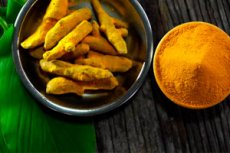New publications
Herbal remedies such as turmeric and green tea are harmful to the liver
Last reviewed: 02.07.2025

All iLive content is medically reviewed or fact checked to ensure as much factual accuracy as possible.
We have strict sourcing guidelines and only link to reputable media sites, academic research institutions and, whenever possible, medically peer reviewed studies. Note that the numbers in parentheses ([1], [2], etc.) are clickable links to these studies.
If you feel that any of our content is inaccurate, out-of-date, or otherwise questionable, please select it and press Ctrl + Enter.

Botanicals such as turmeric, green tea, and black cohosh may seem harmless, but their overuse is increasingly linked to liver damage.
Because botanicals are largely unregulated, chemical tests of products linked to liver crises "often show discrepancies between product labels and the ingredients detected," noted a team led by Dr. Alice Lihitsup, an assistant professor of gastroenterology at the University of Michigan in Ann Arbor.
The researchers focused on the use of six of the most popular botanicals: turmeric, green tea extract, Garcinia cambogia plant, black cohosh, red yeast rice and ashwagandha.
After analyzing data from nearly 9,700 adults from 2017 to 2021 in a federal health database, they found high levels of botanical use. For example, Lihitsup’s team estimated that more than 11 million adults regularly take turmeric supplements, often with the idea that it can relieve pain or arthritis. That’s not much less than the roughly 14.8 million people who take NSAID painkillers for the same reasons.
Unfortunately, "numerous randomized clinical trials have failed to demonstrate any efficacy of turmeric-containing products in osteoarthritis," and excessive turmeric consumption has been associated with serious liver toxicity, the researchers noted.
More than 3 million adults are also estimated to take another potential liver toxin, green tea extract, usually to boost energy and lose weight. But again, "multiple studies have failed to demonstrate any objective evidence of weight loss or sustained improvement in mood or energy levels" with products containing the active ingredients in green tea extract, the Michigan team noted.
Other claims, many of them unsubstantiated, involve other botanicals: Garcinia cambogia is touted for weight loss, black cohosh for hot flashes, and ashwagandha for muscle building. But Lihitsup and her colleagues noted that consumers may overdose on botanicals or be misled by labels that don’t reflect the actual ingredients in their supplements. That could lead to more users ending up in emergency rooms.
According to a national database, cases of liver toxicity associated with botanicals, some of which were severe or even fatal, nearly tripled from 2004 to 2014, from 7 percent of cases to 20 percent. Turmeric, green tea extract, and Garcinia cambogia were frequently cited. Another study found an increase from 12.5 percent of liver toxicity cases in 2007 to 21.1 percent by 2015.
Who uses these botanicals? According to a new study, the most common users are older (average age 52), white (75% of users), and female (57%), who typically have high incomes. People who use botanicals are more likely to suffer from chronic diseases such as arthritis, thyroid disease, or cancer than those who do not use supplements.
In two-thirds of cases, people were taking the botanical at the same time as a prescription drug, the study found. Because of the dangers of drug interactions and liver health, it is vital that botanical users inform their doctors, Lihitsupa's team noted.
When botanicals are abused, liver damage "can not only be severe, leading to liver cell damage with jaundice, but also fatal, resulting in death or liver transplantation," the research team warned.
A previous study found that the number of liver transplants needed due to botanical abuse increased by 70% from 2009 to 2020. The Michigan team believes better regulation and oversight are needed to protect consumers.
"Given the widespread and growing popularity of botanical products, we urge governments to consider increasing regulation of the production, marketing, testing and monitoring of botanical products in the general population," they wrote.
The study was published August 5 in the journal JAMA Network Open.
